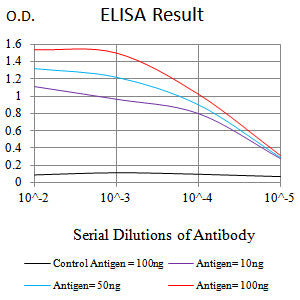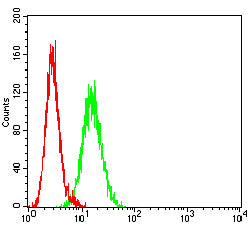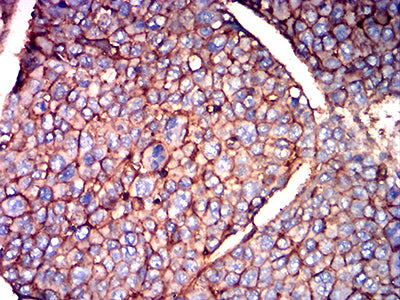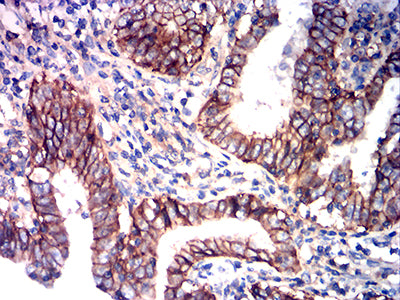



| WB | 咨询技术 | Human,Mouse,Rat |
| IF | 咨询技术 | Human,Mouse,Rat |
| IHC | 1/200-1/1000 | Human,Mouse,Rat |
| ICC | 技术咨询 | Human,Mouse,Rat |
| FCM | 1/200-1/400 | Human,Mouse,Rat |
| Elisa | 1/10000 | Human,Mouse,Rat |
| Aliases | BSG; OK; 5F7; TCSF; EMMPRIN |
| Entrez GeneID | 682 |
| clone | 5A6F8 |
| WB Predicted band size | 42.2kDa |
| Host/Isotype | Mouse IgG1 |
| Antibody Type | Primary antibody |
| Storage | Store at 4°C short term. Aliquot and store at -20°C long term. Avoid freeze/thaw cycles. |
| Species Reactivity | Human |
| Immunogen | Purified recombinant fragment of human CD147 (AA: extra 138-323) expressed in E. Coli. |
| Formulation | Purified antibody in PBS with 0.05% sodium azide |
+ +
以下是3篇关于CD147抗体的参考文献及简要摘要:
1. **"CD147 antibody specifically targets tumor cells and inhibits tumor progression"**
- 作者:Zhang Y, et al.
- 摘要:研究报道了一种靶向CD147的单克隆抗体,通过阻断其与金属蛋白酶(MMPs)的相互作用,抑制肿瘤细胞的侵袭和转移,并在小鼠模型中显著减少肿瘤生长。
2. **"Anti-CD147 therapy suppresses SARS-CoV-2 viral entry by disrupting spike protein interaction"**
- 作者:Wang K, et al.
- 摘要:该研究发现CD147是新冠病毒(SARS-CoV-2)感染的潜在受体,抗CD147抗体可阻断病毒刺突蛋白与宿主细胞的结合,为COVID-19治疗提供了新策略。
3. **"CD147 modulates inflammation and myocardial injury in ischemia-reperfusion via neutrophil recruitment"**
- 作者:Xu J, et al.
- 摘要:通过动物实验证明,阻断CD147可减少中性粒细胞浸润和炎症因子释放,从而减轻心肌缺血再灌注损伤,提示CD147抗体在心血管疾病中的治疗潜力。
如需更具体领域的研究文献,可进一步补充说明。
CD147. also known as Basigin or EMMPRIN (Extracellular Matrix Metalloproteinase Inducer), is a transmembrane glycoprotein widely expressed in various tissues. It plays critical roles in physiological and pathological processes, including viral infection, inflammation, and tumor progression. Structurally, CD147 interacts with multiple partners, such as cyclophilins and integrins, to regulate extracellular matrix remodeling, cell adhesion, and signaling pathways. Its ability to stimulate matrix metalloproteinase (MMP) production in neighboring cells has linked it to cancer metastasis and tissue invasion.
CD147 antibodies are therapeutic or research tools targeting this protein. In oncology, CD147 overexpression correlates with poor prognosis in cancers like hepatocellular carcinoma and melanoma. Antibodies blocking CD147 disrupt tumor-stromal interactions, inhibit pro-metastatic signaling, and suppress angiogenesis. For example, the monoclonal antibody metuximab (Licartin) has been explored in liver cancer therapy by combining with radiotherapy.
In infectious diseases, CD147 serves as an auxiliary receptor for SARS-CoV-2 entry, prompting investigations into anti-CD147 antibodies (e.g., Meplazumab) as COVID-19 treatments. However, clinical efficacy remains under evaluation. Challenges include optimizing target specificity and minimizing off-tumor effects. Current research also explores bispecific antibodies and combination therapies to enhance therapeutic outcomes. Overall, CD147 antibodies represent a versatile but complex avenue for modulating disease pathways.
×